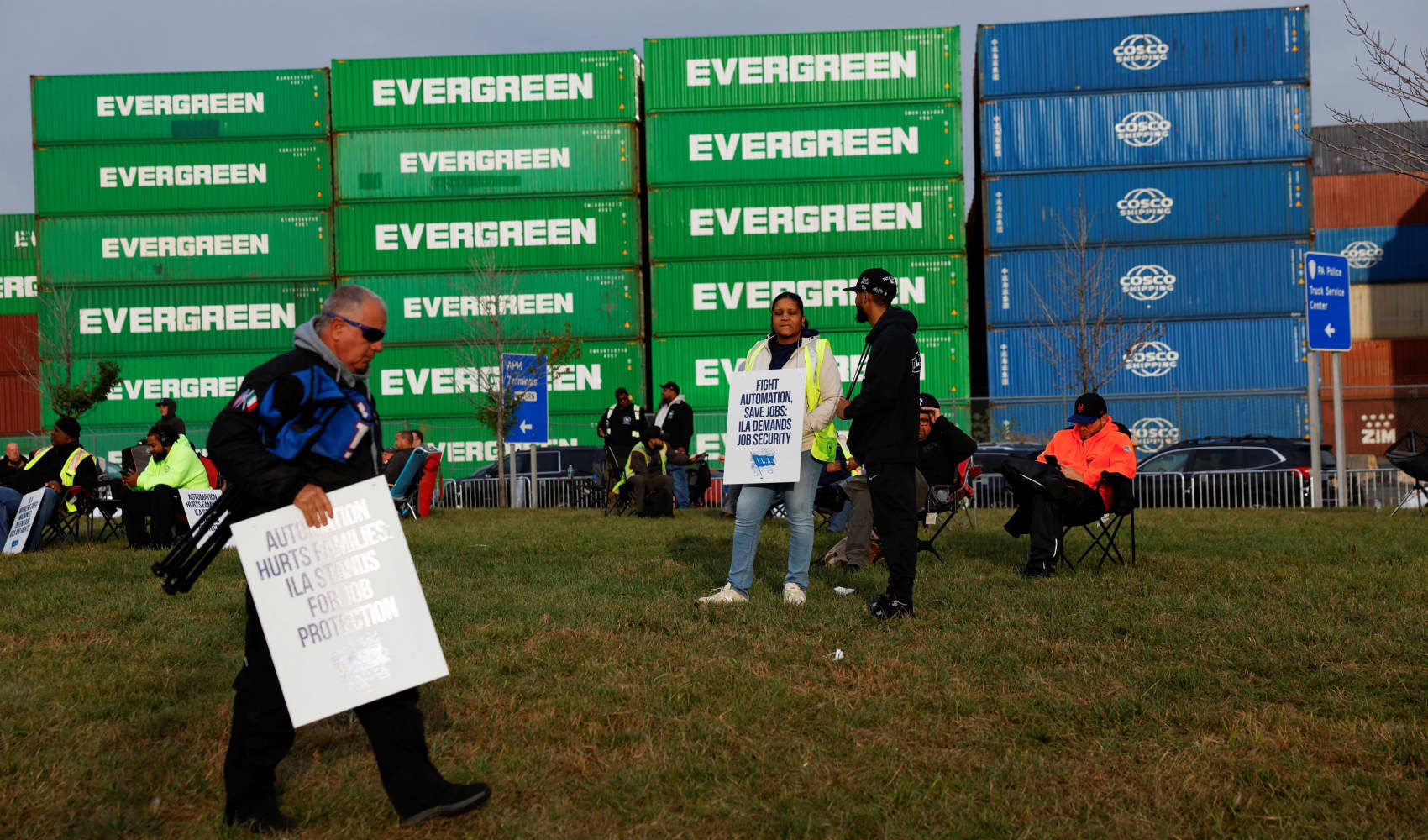Dockworkers have gone on strike and were walking the picket line in South Boston Tuesday, mirroring shut downs happening at ports along the East Cost and Gulf Coast.
The workers are asking for a raise and to not be replaced by automation in the strike that kicked off at midnight on Tuesday.
STAY IN THE KNOW
Watch NBC10 Boston news for free, 24/7, wherever you are. |
|
Get Boston local news, weather forecasts, lifestyle and entertainment stories to your inbox. Sign up for NBC Boston’s newsletters. |
The International Longshoremen's Association represents 85,000 dockworkers in the eastern half of the United States. The union argues that the U.S. Maritime Alliance has been allowing ocean carriers to earn billion-dollar profits without compensating them, and without offering protections against automation.
The two sides were at the bargaining table until late Monday night, with the Maritime Alliance saying its most recent offer would increase wages by nearly 50%, triple employer contributions to employee retirement plans, strengthen health care options and retain the current language around automation and semi-automation.
Get top local stories in Boston delivered to you every morning. Sign up for NBC Boston's News Headlines newsletter.
The ILA rejected the offer.
“We’re just looking for a fair contract and we’re fighting automation," ILA VP for the New England area Bernie O'Donnell said. "It’s pretty simple, we’re just looking for a good contract and we’ll be here as long as it takes to win that battle.”
The U.S. Maritime Alliance released a statement overnight.
“The USMX increased our offer and has also requested an extension of the current Master Contract, now that both sides have moved off their previous positions. We are hopeful that this could allow us to fully resume collective bargaining," the statement said in part.
Meanwhile, experts estimate this strike could represent a $5 billion daily hit to the economy.
“So if you have a week-long strike, it could take anywhere from four to six weeks for recovery," Jonathan Gold from the National Retail Federation said. "If you go two weeks, you're looking at several months before full recovery happens.”
Experts said the first products to be impacted would be perishables like produce and seafood.
Here's more to know about the work stoppage:
Will this strike affect my wallet?
The disruption affects everyday goods from food to car parts and comes just as the holiday shopping season approaches and inflation strains Americans' savings. Economists say the severity of the strike’s impact depends on its duration.
Most food in the U.S. is domestically produced, but not all, like fresh fruits, noted Jason Miller, associate professor of supply chain management and interim chair of the Department of Supply Chain Management at Michigan State University.
"Two, three weeks, it's going to be a little harder to find inventory," Miller said.
Many retailers already prepared for this stoppage and rerouted items from China and Vietnam through the West Coast months ago for the holiday season.
“Santa is still going to arrive," Miller offered.
European products, such as wine, are harder to reroute, though, and he said that, “once domestic stock is depleted, there really isn’t a plan B.”
Joshua Stillwagon, an associate professor at Babson College, said many Massachusetts jobs rely on imported materials, and industries like construction could face issues once inventories run out.
"If it went on for a month, I think that would be really detrimental to the U.S. economy," Stillwagon said.
Despite these challenges, economists like Michael Pearce, deputy chief U.S. economist at Oxford Economics, are confident that this strike is not reminiscent of the pandemic-era supply chain issues.
“Inventories are at more comfortable levels,” Pearce said, indicating more flexibility in the supply chain.
For now, shoppers are not expected to face immediate shortages, but the situation remains fluid.
The picket line, reaction in Boston
There picket line was right outside Conley Terminal in South Boston on Tuesday, Day 1 of the strike.
According to MassPort, Conley Terminal and the Port of Boston support about 66,000 jobs and generate more than $8 billion every year for the state's economy.
"Last year, we got about 36,000 cars coming through the port, we had about 400,000 tires coming through the port and 100,000 refrigerators and freezers," said Jay Zagorsky, of Boston University's Questrom School of Business.
Dockworkers told NBC10 Boston they were fighting for higher wages and protection from automation.
The port in Boston is relatively smaller than other ports, like Baltimore's, which handled more than four times the number of containers that Boston did last year.
"I don't expect major disruptions, right now, to operations here in Massachusetts," Gov. Maura Healey said on Tuesday. "We are a smaller port compared to many other ports in the country, so what I've said, though, is that the parties need to work this out and I call for a quick resolution to this issue."



